AI Engineering Goes Mainstream
AI Engineer World's Fair 2025 Recap — Recapping as much as we can, with exclusive infographic summaries from our friends at Thoth.ai!
When I wrote about the Rise of the AI Engineer almost 2 years ago, I noted that it would feel “inferior” to the ML Engineer and AI Researcher for a long time. Now we see Andrew Ng writing up the “GenAI Application Engineer”, Hamel coining “AI Scientist”, and even Greg Brockman (upcoming guest!) explaining how engineers can have the same impact as researchers at the World’s Fair.
There’s no playbook for “setting up a new sub-industry” — it’s a mix of devrel/ community building, economics/industrial organization, and anthropology+set theory. We started by building out one of the leading newsletters, then podcasts, surveys1, where we cover everything from mental models to trend charts to coding tools to paper syllabi to daily news, anything AI Engineers need, right down to the job description. But perhaps the highest signal, most intentional thing we do to move the industry forward is organize the AIE conferences.
It’s an odd feeling to run a large industry conference: on one hand, we’ve spent months planning every minute of the event and playing 300D calendar tetris, and on the other we’re so busy running the show that we don’t actually see much of it. And afterward we’ve still got postproduction2 and sponsor needs to handle that it’s hard to write an authoritative overview that is still timely. So here’s one person’s best-efforts overview, but you shouldn’t miss the OTHER recaps from others linked below.
Highest Level Highlights
Final count: 3,098 (20% C-level, 17% management, 22% principal/staff eng, 17% senior eng) from a nice split of company sizes (1/3 >1k employees, 1/3 <50) AI engineers, including 306 speakers over 30 workshops + 10 tracks each for 2 days (not to forget: our 69 online speakers) and 30(!!!) independent events across the city.
Special thanks to our community, from Laurie Voss, our incredible emcee, to all track hosts — Henry Mao (MCP), Brittany Walker (Tiny Teams), Eugene Yan (RecSys), Neo4J and Stephen Chin (GraphRAG), Ankur Duggal (AI in Fortune 500 1), Alessio Fanelli (Architect 1), PromptQL and Alex Reibman (Agent Reliability), Seenia Hong (AI PM), Ishan Dhanani (AI Infra), Thor Schaeff (Voice), Vibhu Sapra (SWE-Agents), OpenPipe and Kyle Corbitt (Reasoning+RL), Dat Ngo (Retrieval+Search), Braintrust and Olmo Maldonado (Evals), Randall Hunt (AI in Fortune 500 2), Matt Redmond via Bryan Bischof (Architects 2), Allie Howe (Security), Alexis Gauba (AI Design Eng), Jaril Valenciano (Gen. Media), and Era Qian (Autonomy+Robotics, especially bringing in KScale and Tesla Optimus), interviewers Phlo Young, Sarah/Tyler, Jensen wrangler Nader Khalil and everyone who volunteered and helped others where we simply couldn’t (team credits in livestream). It was truly the “Avengers Assemble” of AI Eng.
Launches both on stage and by sponsors during AIEWF week (NON-EXHAUSTIVE!):
Gemini 2.5 Pro (06-05) launched onstage by Logan Kilpatrick’s keynote (with roadmap for Gemini Code, Deep Research API, and Computer Use API)
OpenAI Agents TypeScript SDK launched by Dominik Kundel for his workshop
OpenAI Agent Robustness Team announced by Fouad Matin, Security keynote
Anthropic MCP Request for Startups offered by Theodora Chu, MCP PM
Anthropic Claude Code Plan Mode with Boris Cherny, Claude Code creator
Dagger’s container-use launched onstage by Solomon Hykes’ keynote
Morph Liquid Metal and Magi-1 model launched onstage by Jesse Han and hiring Christian Szegedy as “one of the highest aura announcements ever”
Verified Superintelligence by Morph’s Christian Szegedy, announced as Trinity
AI Diplomacy launched onstage by Alex Duffy — best speaker for Tiny Teams
ElevenLabs launched their v3 alpha with Thor Schaeff — track host for Voice
LlamaIndex’s LlamaCloud Excel Support
ARC-AGI 3 previewed onstage by Greg Kamradt, President ARC Foundation
Huxe AI launched by former guest Raiza Martin, AI Product Mgmt keynote
Exa Research launched from former guest Will Bryk — best speaker in Search
Traversal AI announced by Anish Agarwal and team on Reliable Agents track
Modal’s LLM Almanac launched by upcoming guest Charles Frye
HackAPrompt AIE launched by former guest Sander Schulhoff
Simon Willison’s PelicanBench ELO rankings on his blog
let @swyx know if we missed some big launch
Bonus Post AIEWF Lightning Pod with Alex Duffy (Best Speaker, Tiny Teams) on AI Diplomacy
Links to Your Reflections, Takeaways
Apart from all the posts in the AI Engineering community and tags of @aidotengineer, these are the bigger reflections/recap posts we know of:
swyx: AIEWF Day 1 on TBPN
swyx: AIEWF Day 2 on ThursdAI
Turing Post: Holy Shit moments vs Not There Yet (video)
Simon Willison: The last six months in LLMs, illustrated by pelicans on bicycles
Lance Martin: The state of AI agents
Charlie Guo: The State of AI Engineering (2025)
Danny Thompson: How Tiny Teams Built $10M Startups in Months
Mickey Bazeley: AIE x MongoDB reflections on Multi-Agent Systems
Anita Kirkovska (guest author): What’s shaping AI products, agents, and infrastructure in 2025
Patrick Ellis: The startup playbook is being rewritten in real-time
Derek Sheerin: Reflections on the AI Engineering World Fair 2025
Lena Hall: FOMO track from AIEWF
Short takes: Alex Volkov, Yogi Miraje, Danny Thompson, Eugene Yan, Balazs Nemethi
Mainstage Keynote Recaps
As AIEWF is basically “18 conferences in one”, and many speakers would be keynoters in any other conference, there’s too much to cover by any one person, but we do have plenary stages for stuff that doesn’t quite fit into any one theme.
Because the Day 1 and Day 2 livestreams are already up, we’ll focus on them for now and break out selected takeaways later, illustrated by our friends from Thoth AI, returning to AIEWF for the second time!
Asha Sharma — Spark to System: Building the Open Agentic Web

In a tightly polished set of demos, Microsoft sees the next leg of AIE in 3 themes:
from pair → peer programming: GitHub Copilot can be @assigned and GraphRAG on your codebase and even autonomously do MLE with Project Amelie
from software → agent factory: every company should have a platform (aka “AI Foundry”) that can help churn out agents with the full set of LLM OS tools: model routing, security, reliability, agentic RAG, MCP tools, observability… and even voice posts, imagegen, and posting directly to LinkedIn!
from cloud → local AI: running open models on device with Foundry Local
swyx’s note: we are very sorry that the 3rd demo ran overtime just as the demos were heating up in the youtube chat; we’ll try to make it up on a full pod.
Sarah Guo — The State of Startups & AI 2025

The top lesson from the last 2.5 years since founding Conviction:
“I have never seen the uptake from users that has been possible in the last couple years… AI engineering is quite a bit harder than people had hoped, but the value creation is massive. We see companies going from 0 to 100m in run rate faster than we’ve ever seen in any technology revolution before.”
How to build Cursor for X:
Reasoning is the new vector for scaling
Agents, agents, agents: less of chatbots, more like a colleague
Multimodality isn’t niche: both Video and Voice will sweep the economy
Sam Altman: “Last year’s model is a commodity”
Code is the first AI Killer App because it’s structured text with deterministic validation, on the path to AGI, and most imptly engineers can build for themselves.
She abstracts this to a recipe for building Thick AI Wrappers (we approve) and that startups that do this in every vertical and profession can leapfrog incumbents — if they have good execution and don’t rest on a launch. See their Requests for Startups.
Simon Willison — The last six months in LLMs, illustrated by pelicans on bicycles
Best recapped on his website and Hacker News:
The big trends:
30 significant model releases in last 6 months: Nova is cheap, DeepSeek was great, Mistral Small was a great competitor to Llama 3.3, Claude 3.7 → GPT 4.5 → o1-pro → Gemini 2.5 Pro → GPT 4.1 → Claude 4. 4o imagegen was very special
Bugs: 4o sycophancy, Grok’s issues, Claude 4’s snitching was a big deal
MCP = Tools+Reasoning: “I think this is the most powerful technique in AI Engineering right now”
Security: The Lethal Trifecta: when models have 1) access to private data, 2) exposure to malicious instructions, 3) exfiltration vectors
This was our first year handing out Best Speaker awards to spark the competitive spirit in our speakers, and Simon handily won the overall AIE Best Speaker trophy with his mix of humor and technically relevant insight.
Antje Barth — Building Agents at Cloud-Scale
Antje teased the coming Alexa+Claude integration, discussed how Amazon Q Developer (also presented by Vikash Agrawal from the team) was built in 2 weeks, with Strands Agents (name picked by AI!) that is basically a form of Agent-specific AWS SDK that has a surprisingly complete set of agent capabilities supported.
Kevin Hou — Windsurf everywhere, doing everything, all at once
Software Engineering != Coding. Returning for his 3rd time at AIE, Kevin revealed the “secret sauce” of Windsurf is progressively abstracting the inner and then outer loop of software engineering with AI, and then modeling the “meta-learning” that engineers do, right up to using their data flywheel (ship → feedback → improve) to build their SWE-1 model for both handling tasks end-to-end (only asking humans for review and approval) and for conversational, human-in-the-loop tasks.
Greg Brockman - #define AI Engineer
We will probably defer a full breakdown of this to Greg’s podcast but this was the most popular clip from our chat (with a special cameo from Jensen Huang):
Logan Kilpatrick — A year of Gemini progress + what comes next
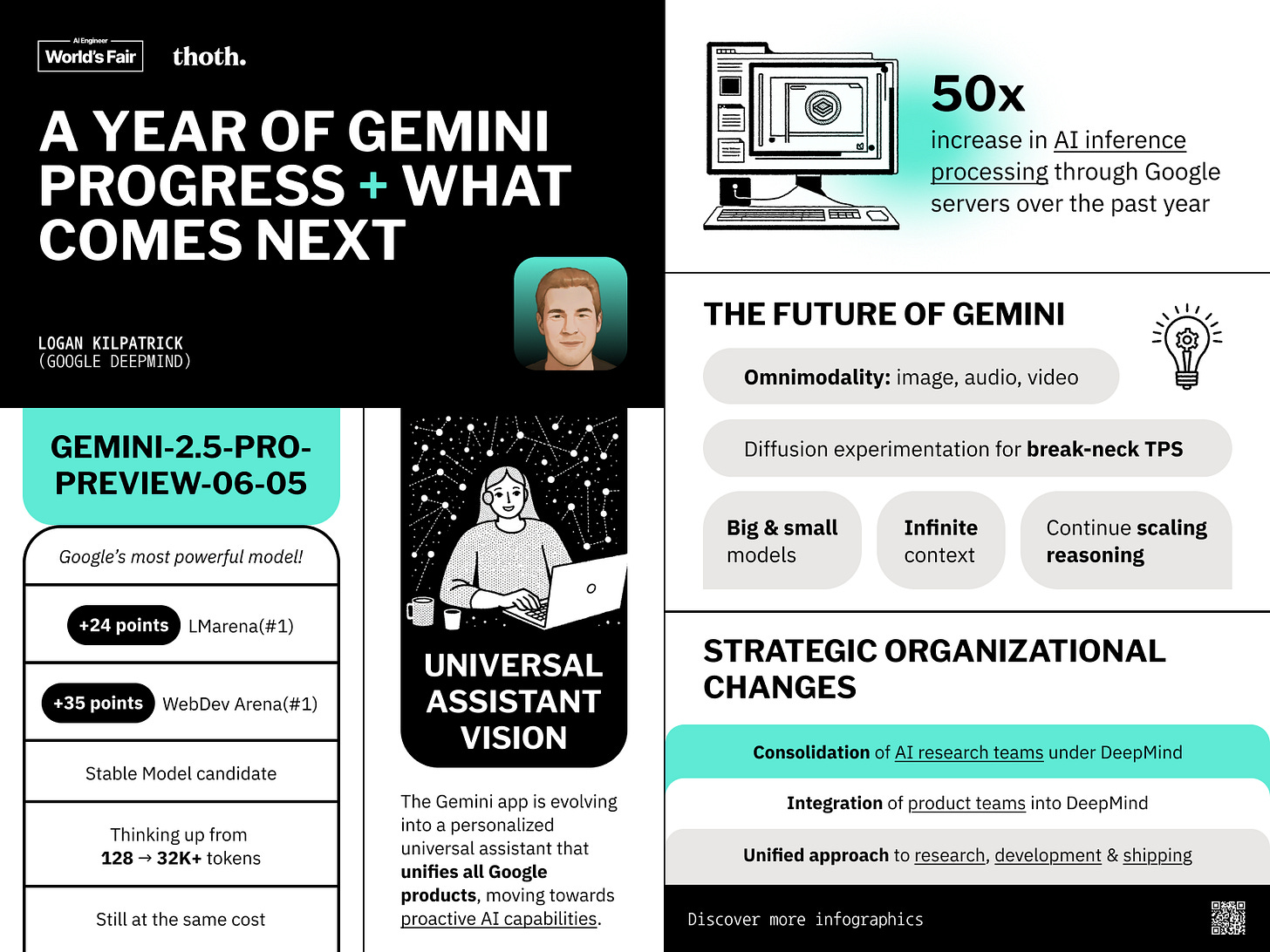
Logan knew how to please the crowd by starting “Google Day” with the final Gemini 2.5 Pro preview launch onstage, but perhaps the real alpha came at the end discussing the GDM roadmap - our read is that Veo 3 is likely to be merged into mainline Gemini, more Gemma models will be released, new architecture work for infinite context is underway, and that still-not-shipped Gemini Ultra is still on the table.
He is increasingly pushing the thesis that models are becoming agents out of the box which is informing the work that is being done by the API team, which also shared the roadmap including new announcements for Gemini Code, Deep Research API, and Computer Use API.
Jack Rae — Thinking Deeper in Gemini

Jack presented this keynote for the reasoning team at Gemini just before departing for Meta’s new Superintelligence division with Alexandr Wang. When Flash Thinking first emerged it seemed an unusual terminology for what everyone else was calling “inference time compute”. But it seems clearer that their definition of thinking is more than just raw chain of thought quantity (17x higher (!!!) than 2.0 Flash as Artificial Analysis observes), but also on efficiency and reasoning from a small set of axioms. New science will be invented only after we can cleanly recreate old research.
Solomon Hykes — Containing Agent Chaos

In one of the most talked-about launches of the conference, Solomon Hykes retook to the same stage he launched DockerCon to open source container-use, Dagger’s answer for containerized environments for every agent (something that until now has been constrained to custom orchestration/Firecracker in the cloud, or non-sandboxed git worktrees in local dev. If you run parallel Claude Code instances, this is the way.
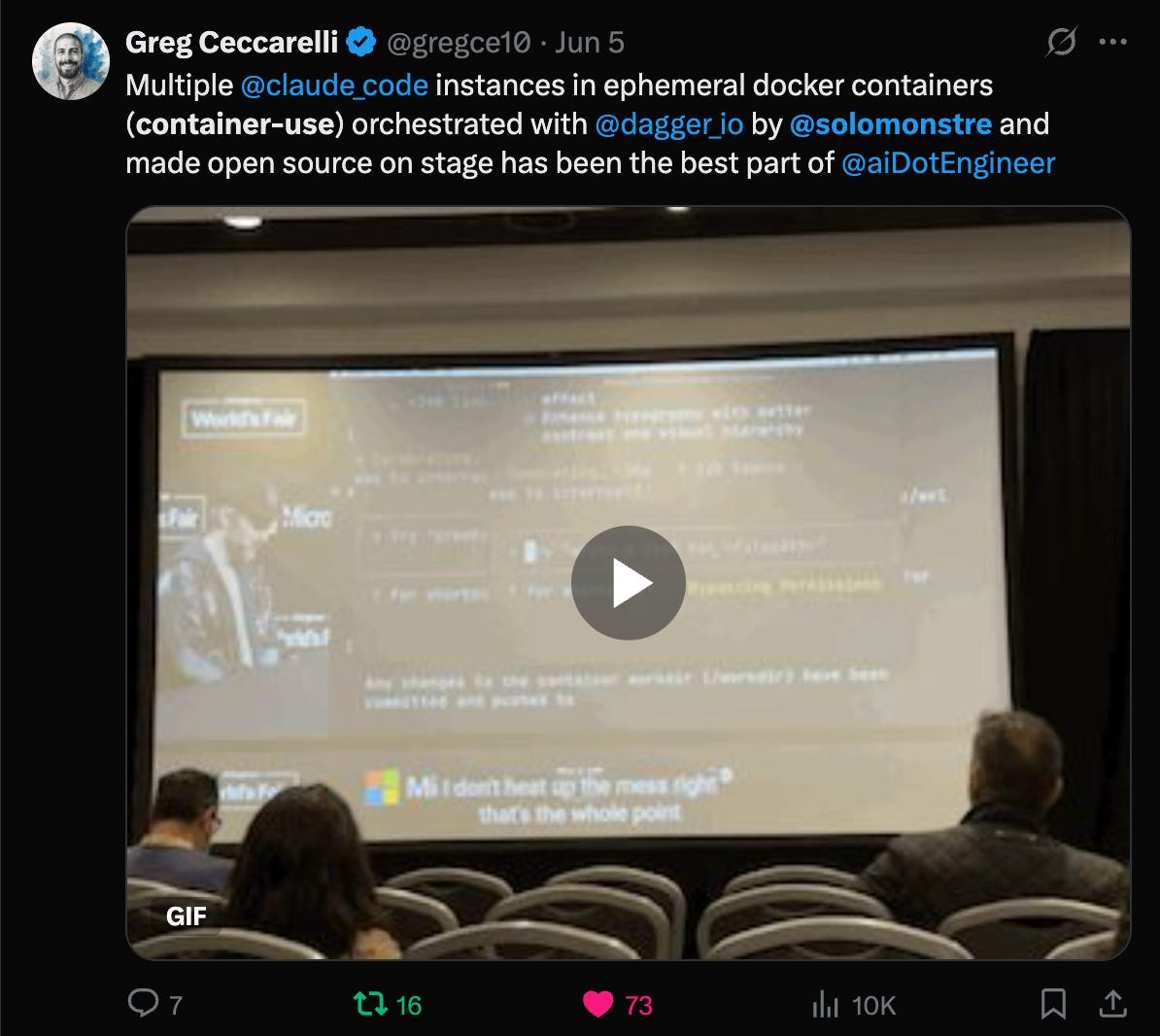
Jesse Han — The Infrastructure for the Singularity

Jesse Han, as a former member of the GPT4 team, took a much more philosophical view, arguing that we want to cater to the machine’s fundamental desires and work backward from there. Yes they want sandboxing, but we also want superlative cloud infrastructure to match the needs of the superintelligence. He announced Morph Liquid Metal and Magi-1 model, as well as hiring Christian Szegedy as Chief Scientist as “one of the highest aura employment announcements ever”.
George Cameron — Trends Across the AI Frontier

With Micah absent due to all-too-familiar visa issues, George delivered with Artificial Analysis’ trademark polish, an overview of all the big trends. The “money” slide was an unexpected rerendition of Wirth’s Law (aka Gates’ Law) - what distillation/ inference/hardware people giveth, bigmodel/reasoning/agents people taketh.
Barr Yaron — State of AI Engineering 2025
This is the second official AIE survey done with Barr/Amplify. As mentioned we’ll discuss this when the full survey results are published, but a fun chart was Barr being able to quantify the gap between Text and other modalities. This is probably the last year that Voice AI trails behind Image gen.
Alex Atallah — fun stories from building OpenRouter and where all this is going

OpenRouter is Andrej’s new candidate for top tier eval, and we were delighted to have Alex join AIE to tell the OpenRouter story for the first time. We think LLM Gateways are a very fundamental component of the AI Engineering stack, and OpenRouter is objectively one of the biggest in production LLM gateways right now, and grows in importance as relevant model lab diversity increases (not at all a consensus opinion when OpenRouter started). Alex outlined the future of “Inference-Native Middleware” as a input -and output- transform complement to MCPs.
Sean Grove — The New Code
The last conference Ben organized pre AI Engineer ended with Sean, Ben, and myself, so it seems weirdly fitting that AIEWF 2025 ends with the AI versions of us. Sean now works on Alignment Research at OpenAI, advocating for why things like the OpenAI Model Spec are underrated and in fact needed, directly addressing the 4o sycophancy issue, and arguing that the best coder is actually just going to be the best communicator (and well structured communication, like having a spec, is the best approach both to alignment and for creating anything with AI).
There’s more recaps to do, particularly with the bigger tracks of the conference and the major launches, but we’ll just get this out now just to ship in a timely fashion.
To give the speakers their due credit, please skim the timelines of:
Day 1:
and Day 2:
for the full story!
full survey shipping soon! thanks for taking part - You can see preliminary results in Barr’s presentation at the end of Day 2. We also had a brief attempt at a foundation and there may be another crack at that someday.
Other than the 8 livestreams + the online track, we will edit and post up all talk videos in weeks, not months





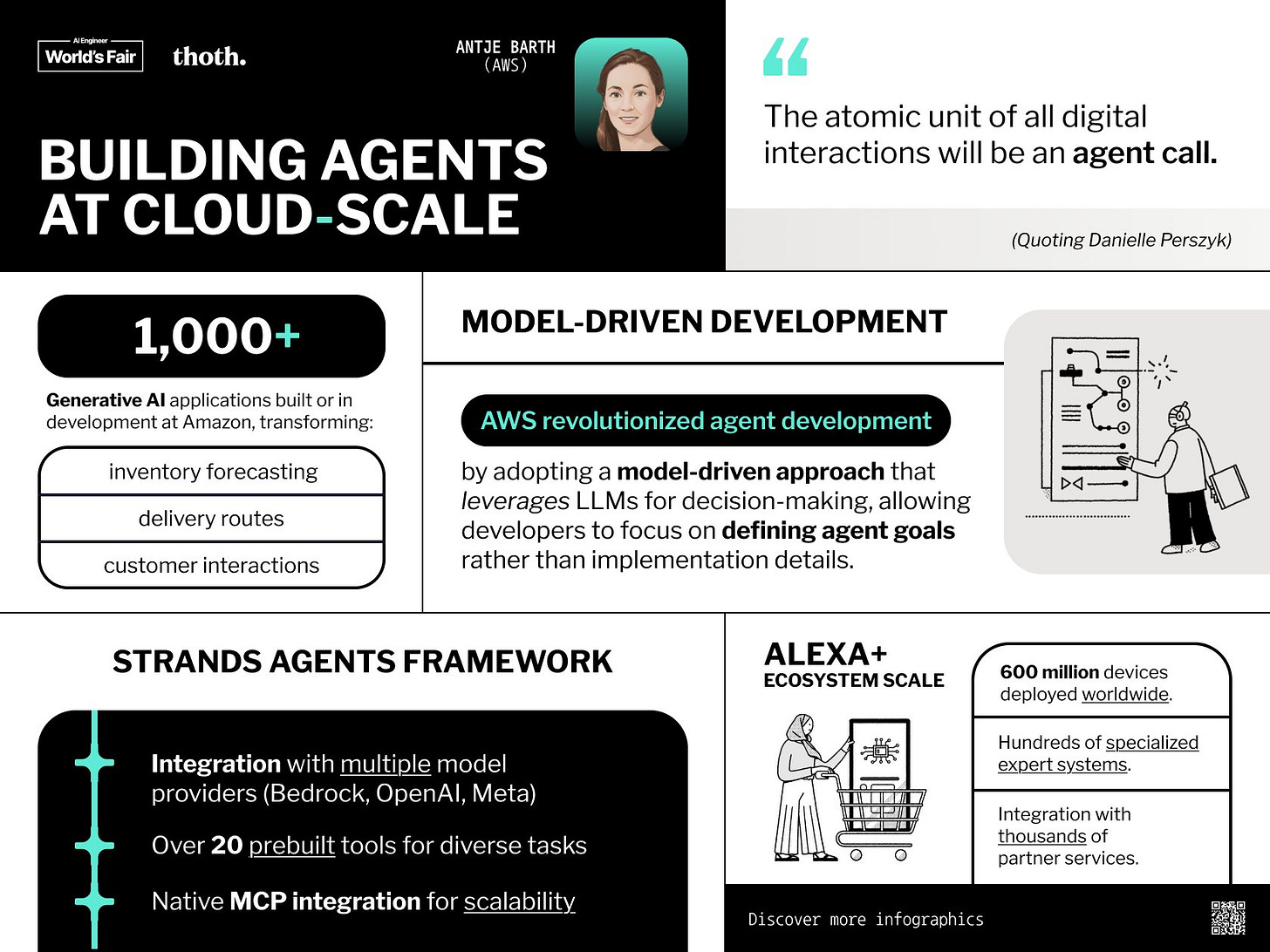

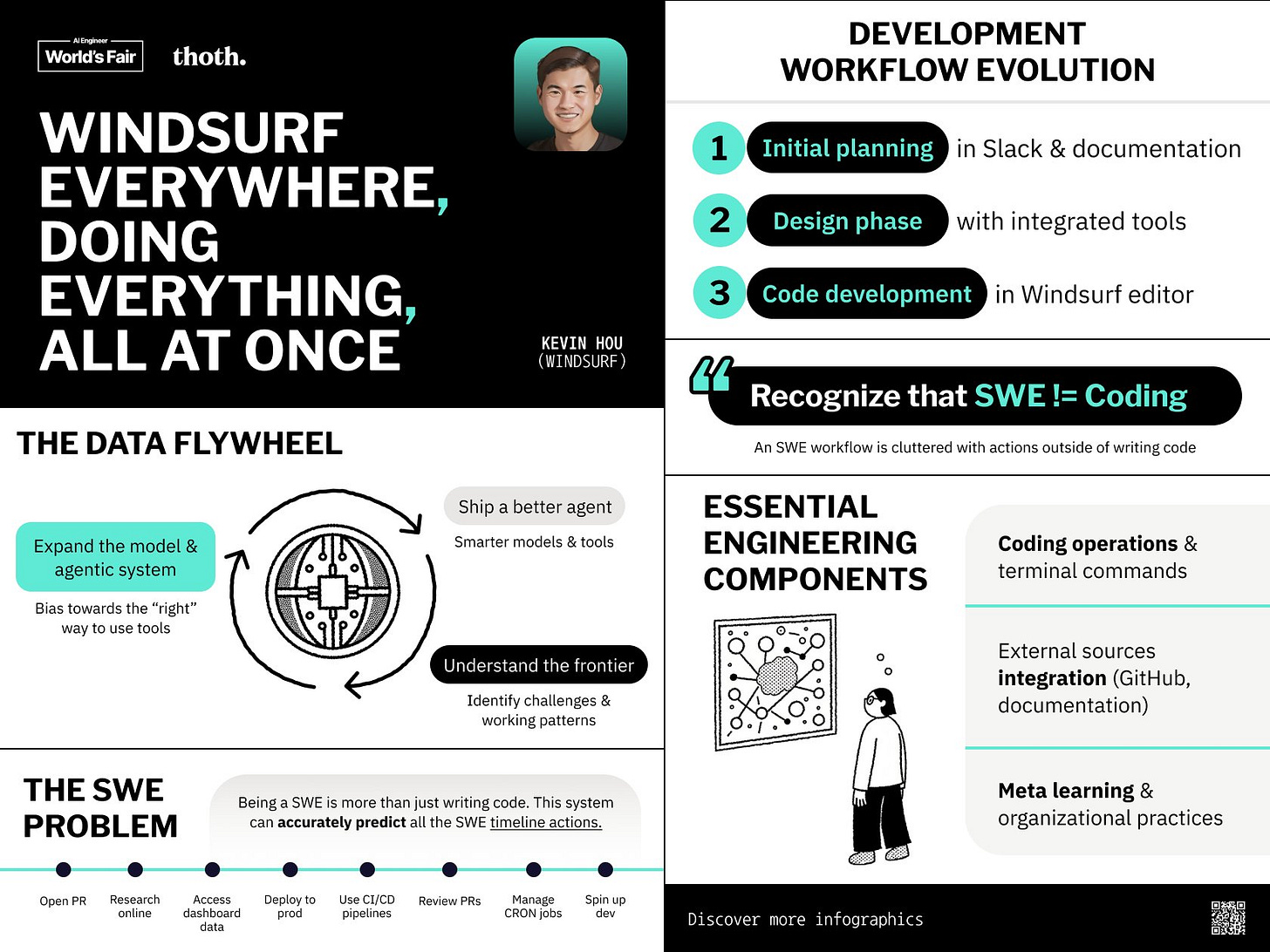

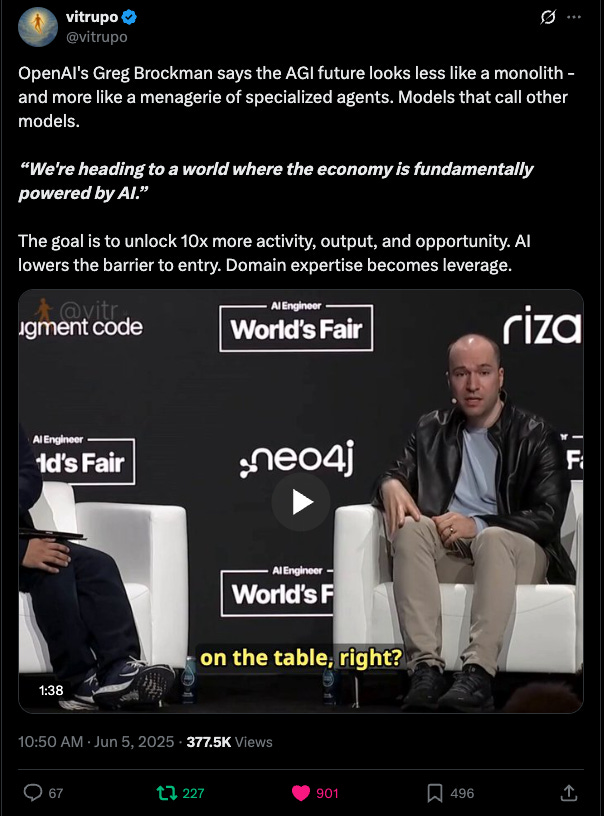




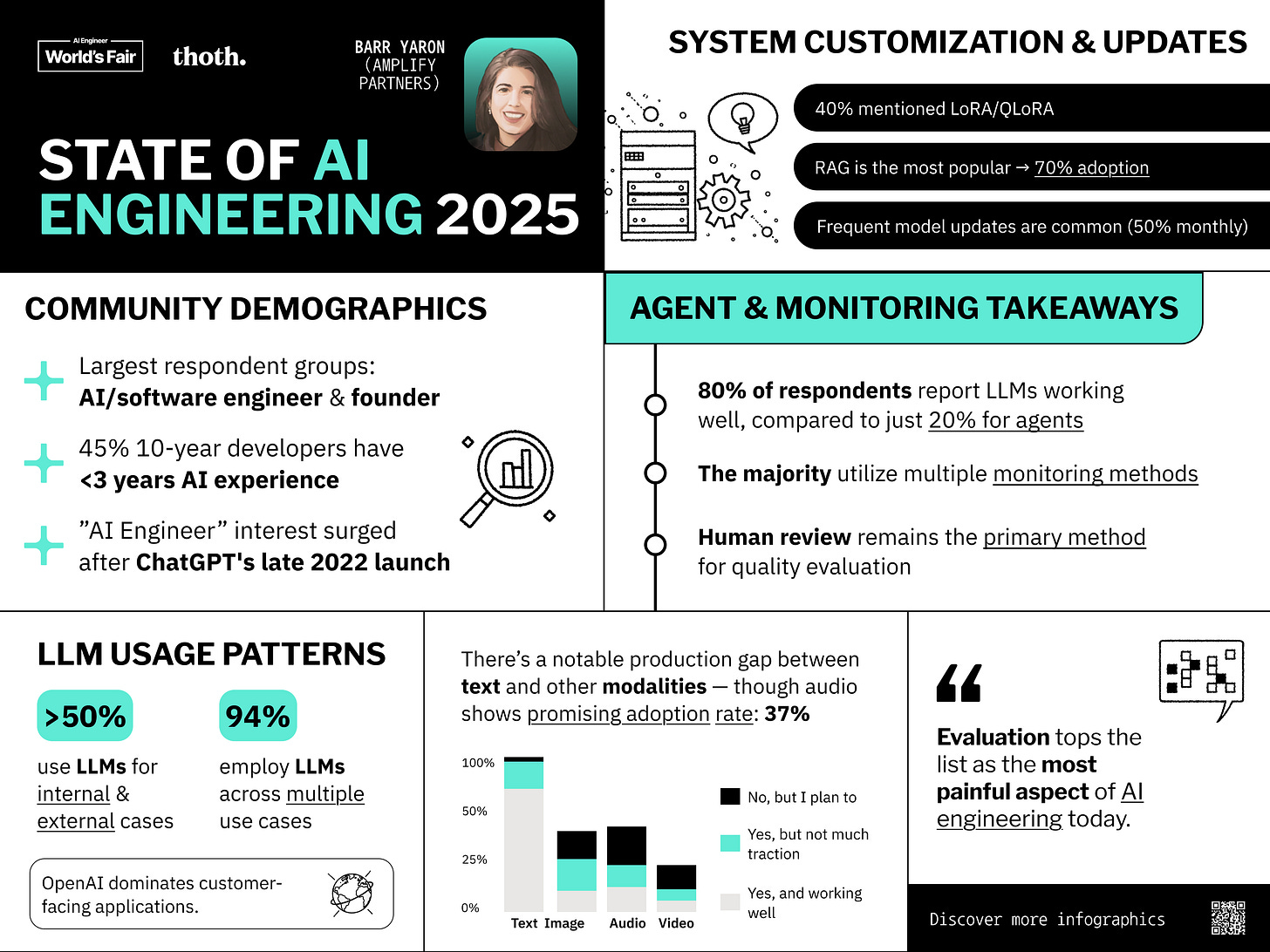




https://danafharbaugh.substack.com/p/disco-ball-warfare
How AI helped a lost Veteran find healing and launch a groundbreaking new business.